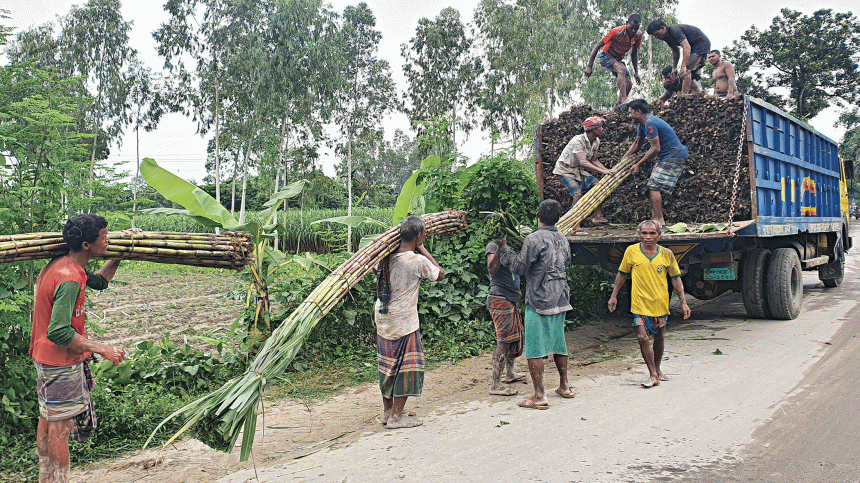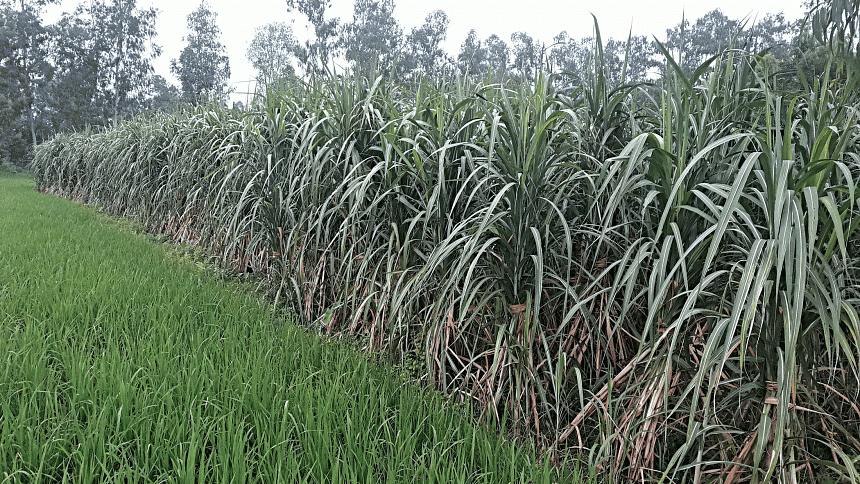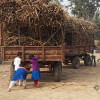New sugarcane prices perk up farmers

The government has refixed prices at which it would buy sugarcane from farmers, raising hopes that it would encourage an increase in the crop's cultivation across the country.
On failing to gain profits as per expectations, farmers have been gradually giving up sugarcane cultivation across the country, resulting in a fall in production, said sources.
In fiscal year 2000-21, 69 lakh tonnes of sugarcane had been produced on some 4.21 lakh acres of land, according to the Bangladesh Bureau of Statistics.
In fiscal year 2012-13, it dropped to 44.68 lakh tonnes on 2.69 lakh acres.
Afterwards, it came down substantially, to 30.87 lakh tonnes on 1.78 lakh acres.
Taking this into consideration, the Ministry of Industries has started purchasing sugarcane at a 22 percent higher price from the harvesting season of fiscal year 2023-24.

The price will be increased by a further 9 percent in the following year.
The order on the price refixation was issued on August 10 by Afroza Begum Parul, senior assistant secretary to the Bangladesh Sugar and Food Industries Corporation (BSFIC) under the Ministry of Industries, as per official sources.
According to the new order, the price of each quintal (100 kilogrammes) of sugarcane has been refixed at Tk 550 if the farmer bring it to the mill gate, effective from the harvesting season of fiscal year 2023-24.
Previously it was Tk 450.
For purchases away from the mill gate,the price has been refixed at Tk 540 from Tk 440.
From the harvesting season of fiscal year 2024-25, the prices will be raised to Tk 600 and Tk 587 respectively.
The new sugarcane prices have brought happiness among farmers and production will increase across the country, Shajahan Ali Badsha, secretary to Bangladesh Sugarcane Farmers' Federation, told The Daily Star.
"Farmers have lost interest in sugarcane cultivation over the last couple of years due to poor prices offered for the money earning crop," he said.
"Many farmers have stopped cultivating sugarcane and used their fields for cultivating crops that bring in better profits over the last couple of years, for which sugarcane supplies to state-owned sugar mills have gradually dropped," Badsha said.
He himself said to have cultivated sugarcane on 70 bighas to 80 bighas of land in the Pabna sugar mill zone till the mill was shut down through a government order on December 2, 2020.
But he has reduced the amount of land used to 8 bighas to 10 bighas over the last couple of years for the poor prices.
"When Pabna sugar mill was running, I was very much interested about sugarcane cultivation," he said.
"But I have now lost my interest as there are other crops that enable earning more profit. The mill was shut down, ending an easy sales facility for farmers in this region," he added.
Md Amzad Malitha, a farmer of Ishwardi upazila in Pabna who used to produce some of the biggest volumes of sugarcane, said he had stopped cultivating the crop over the last couple of years and had now switched to cultivating vegetables.
"Sugarcane occupies the land for 12 months to 14 months before it can be harvested. Three other types of crops could have been harvested taking the same amount of time," he said.
"Due to a lack of profit, I stopped cultivating sugarcane. But the new price could bring new opportunities," Amzad added.
According to the BSFIC, sugar production at the state-run mills has fallen over the last couple years due to a lack of sugarcane in the crushing period.
The corporation produced 21,314 tonnes of sugar in fiscal year 2022-23, down 13 percent from the same period a year ago. It had a target to produce nearly 53,000 tonnes of sugar last fiscal year.
"Sugarcane is called an insurance crop as its price is fixed by the government and so there is no scope of a price fall. Even droughts, rains and storms can do no harm," said Badsha of the farmers' association.
"The government has refixed sugarcane prices for the sake of farmers, so the farmers are likely to again take up sugarcane cultivation soon," he added.
Md Arifur Rahman Apu, chairman of the BSFIC, which runs state sugar mills, said the corporation hiked the prices so that farmers can make a profit and feel encouraged to grow sugarcane.
"Farmers are becoming disinclined to cultivating sugarcane. They complain that they cannot make a profit. We hope growers will be interested to grow sugarcane after our purchase price hike," he said.
The BSFIC targets to buy 600,000 tonnes of sugarcane for crushing in mills this fiscal year to produce 40,000 tonnes of sugar.
"We want to start crushing sugarcanes in mills within November subject to the maturity of sugarcane," he said.
He said the BSFIC was also working to enable farmers to follow Good Agricultural Practice (GAP) and take better care of sugarcane to increase yields.
The average yield per acre is now nearly 30 tonnes but it is possible to double the yield, he added.
The recovery rate for sugarcane will also increase if farmers use good varieties of sugarcane, he said, adding that the agency has taken up a five-year plan to expand sugarcane cultivation.
"If we increase availability of sugarcane and recovery rate, mills will be able to run for 120 days to 130 days and arrive at a break even," he added.
Hazi Yeasin, a sugarcane farmer of Harian Rajshahi, a northern district, once grew sugarcane on over 10 acres area. He reduced plantation area to a couple of acres frustrated by delays in getting payment from mills.
"So, increasing prices will not solve the problem alone. Proper management is necessary to benefit farmers," he added.
However, Md Anwar Hossain, a farmer in Joypurhat, another northern district, said the new price was much better.
"We need timely payment. We are interested in cultivating sugarcane for getting handsome returns. But we get harassed when it comes to getting payments from mills. If payment becomes normal, cultivation must increase," he added.

 For all latest news, follow The Daily Star's Google News channel.
For all latest news, follow The Daily Star's Google News channel. 





Comments